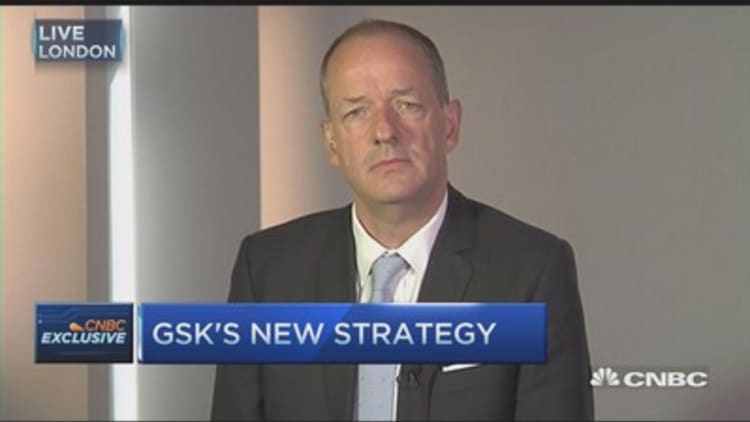
Pharmaceuticals company GlaxoSmithKline is looking beyond the industry focus on price pressure and focusing on three key areas to take advantage of "enormous volume opportunity," especially in emerging markets, CEO Andrew Witty said on Wednesday.
GlaxoSmithKline laid out growth targets for its biggest businesses on Wednesday, hoping to convince investors that focusing on consumer health and vaccines would return the drugmaker to long-term growth.
"We think we're really aligned with where the river is flowing. The river is flowing for more volume. We're going to focus on that, get that volume out there at a fair price, get a good return on our R&D investment, but not be fixated on defending ever and ever higher prices in the developed world," he told CNBC's "Squawk Box."
Witty is under pressure to prove to investors that a $20 billion-plus asset swap with Novartis can revive GSK's fortunes, following a damaging slide in lung drug sales and a major corruption scandal in China.
Read More Nearly ALL adults in this country will be overweight
Britain's biggest drugmaker said it expected group sales to rise by a low- to mid-single-digit percentage rate annually to 2020. Its pharmaceuticals, vaccines and consumer health businesses would increase annual sales by low single digits, mid-to-high single digits and mid-single digits, respectively, it added.
In the next three years, GSK sees its over-the-counter business booming as 300 million new health-care customers begin buying products in the segment, he said. The same number of people are projected to turn 50 in the next five years, potentially bolstering GSK's vaccine and pharmaceuticals business, Witty added.
GSK's vaccine business should also grow as 130 million children are born every year for the next three years, he said.
To execute on its bet that volume will trump price, GSK has been undercutting competitors to increase volume and access over the last several years, Witty said.
GSK has sold its cancer drugs portfolio to Novartis, while buying Novartis' vaccines and at the same time boosting its consumer health business through a joint venture with the Swiss company.
This reduces GSK's reliance on risky drug development and increases its exposure to more stable consumer and vaccines operations, both of which have long-lasting products but, in the case of consumer health, lower margins.
"Andrew Witty desperately needs this to succeed in order to leave a legacy worth remembering," said Mick Cooper, analyst at Edison Investment Research.
Read More Alexion Pharma to buy Synageva BioPharma for $8.4 bln
In a bid to protect its dividend, GSK scaled back plans to return $6 billion of cash flowing from the Novartis transaction to investors and will instead pay $1.5 billion as a special dividend.
Over half of the total synergies of $1.5 billion from the Novartis deal are now expected in 2016—rather than a previous date of 2017—and the integration of the Novartis divisions is now expected to be "broadly complete" by the end of 2017, earlier than 2019, which was previously flagged.
In its earnings report for the period, the pharma giant also ruled out a spinout of its HIV/Aids treatment division, ViiV Healthcare, given what it called a "strong positive outlook."
GSK reported quarterly sales of $8.57 billion, unchanged from a year earlier in sterling terms. Core earnings per share were down 18 percent at 17.3 pence (26.4 cents).
Analysts, on average, had forecast sales of $8.57 billion pounds and core EPS, which excludes certain items, of 17.4 pence (26.5 cents), according to Thomson Reuters.
GSK shares were about 1.5 percent higher after the update.
—Reuters contributed to this story.



